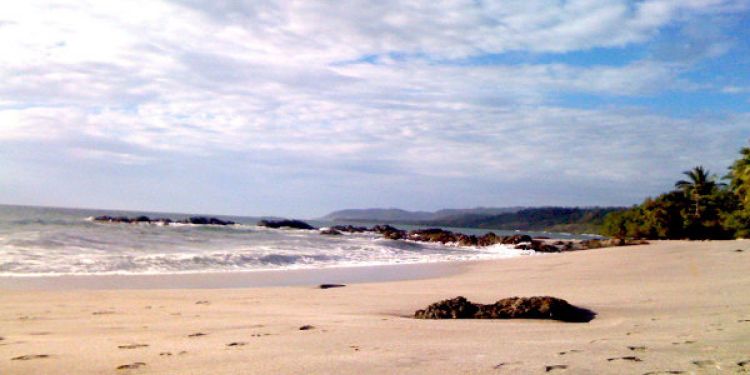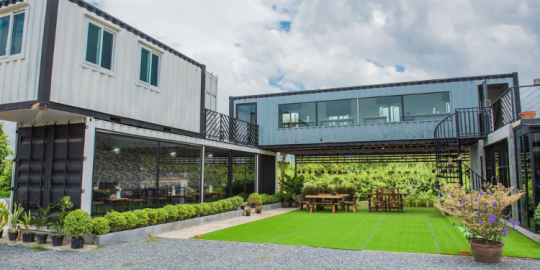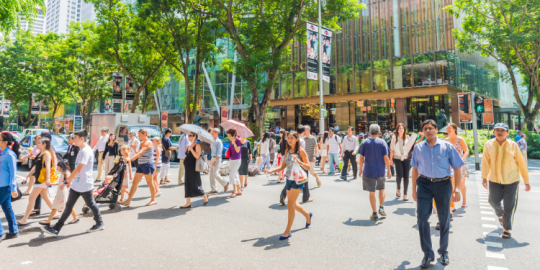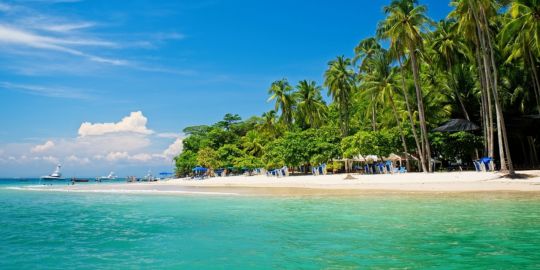Where are you from, David, and what are you doing nowadays?
My name is David. I was born and grew up in the States in Oregon. I moved to Northern California for college and stayed in San Francisco after graduation. My background/education was in law but I ended up in sales and imports.
Why did you choose to move to Costa Rica?
In 2006, I was involved in a very bad car accident where I ended up with 32 broken bones, multiple torn tendons and ligaments and to top it all off a fun little thing called a traumatic brain injury (TBI). Because of the TBI, loud noises, a lot of activity of any kind wear me out very quickly. I become exhausted both mentally and physically. Put simply, I needed a peaceful quiet life and felt the States did not offer this at a price that I could afford.
I had traveled to a number of countries prior to the accident and knew that Central America was an area I liked and felt would be more tranquil. After adjusting to life here it is much, much more peaceful and laid back in comparison to the States. Life is just slower.
What were the procedures to follow for a US national to move there?
First step is to visit a few times. Once as a vacation to see if you might like it. Next would be what is often referred to as a "due diligence tour", meaning, come down for "at least" a month and get more of a feel for life around the country. When visiting Costa Rica, you are required to have a round trip airline ticket. Assuming that you're a "normal" person, visas are automatic for travel from most countries. Upon arrival, your passport is stamped with a tourist visa which is valid for 30 to 90 days (often depending on the custom agent's mood, but usually 90 days).
If someone wishes to move here permanently or semi-permanently, he can apply for residency. Visa and legal fees should amount to approximately US $ 2,000. The average time to complete the process is one year. There are several types of residencies a person can apply for: Pensionado, Rentista, Perpetual Tourist.
How long have you been in the country?
I have now lived in Costa Rica for five years. My twenty-three year old daughter lives with me. She owns and operates the Parrot Rescue Center of Costa Rica. She had come down with me with the idea of staying just for a few months but the country grew on her and she fell in love with the wildlife and decided to stay.
What has attracted you to San Ramon?

I settled in San Ramon quite by accident. From the research I had done prior to moving, the plan was to be located in either the Grecia area or Atenas. The person who shipped my belongings convinced me to try the San Ramon area first. So I rented a "Gringo style" house for the first year. As with most Gringos, I paid too much for the rental but learned a lot in the process.
I would say that the main thing that kept me in this area was the weather and the Tico people, (Costa Ricans refer to themselves as "Ticos"). Most of the time I prefer Ticos to Gringos. Ticos are very easy going and most place family first. They don't just say it, they live it. Work does not come first, family and life is first.
Was it difficult to find accommodation there? What are the types of accommodation which are available there?
For the initial visit to Costa Rica, there are many hotels in all price ranges. For long term visits, there are houses, apartments and condos rentals in all regions. Prices range from US $ 200.00 per month into the thousands, depending on your taste. An average 3 bedroom home outside the San Jose region would cost some US $ 750.00 per month. Inside San Jose you will pay more, but there is low-cost housing as well. I often suggest that people look at Craigslist Costa Rica to get an idea of housing cost, motor vehicles, etc.
As for me, I befriended a Tico family who after a while offered me to purchase a portion of their land to build on. I purchased 5,000 m 2 of land which is found at some 6 km from San Ramon, in Alajuela. It's isolated enough so that it feels like we're in the middle of nowhere, but still close to town. It's very peaceful with a year round creek running through and a spring from which we get our drinking water. There are capuchin and howler monkeys right next to the house at times and my favorite, toucans in the trees most of the time. As my daughter has the parrot rescue on the property, we also have scarlet macaws, yellow-nape and red-lored amazons as well as other parrots flying free at all times. Yes, very peaceful and tranquil...
The weather was another factor for me settling here. It's never too hot or too cold. The average day time temperature is around 80 degrees Fahrenheit (27°C), and night time around 60 degrees Fahrenheit (15°C). If I was looking again, I would consider living near Palmares. They don't get as many foggy days as we do during the rainy season. It's about 12 km from San Ramon.
Are you currently working? What are the local labor market's specificities?
Due to TBI, I was forced to retire early. I moved here when I was 54. But I can say that unless you have been granted permanent residency, you cannot legally work in Costa Rica. There are a few exceptions to this rule. There are some companies which sponsor work visas. Moreover, if you own your own company you can also draw a salary from this, but my understanding is that the majority of the work must be performed by Ticos.
The pay scale is also very, very low compared to developed countries. For example, a non-skilled laborer will earn the equivalent of about US $ 3.00 per hour and skilled labor such as welders, carpenters, etc, will earn the equivalent of about US $ 6.00 per hour. Put simply, there are not many jobs in Costa Rica. Unemployment rate runs at about 8%. My experience has been that most expats here, if not retired, create their own employment: small businesses, online work, etc.

How do you find the Tico lifestyle?
As I did grow up in the States, it was an adjustment. For me, it was a bit more difficult because I enjoyed working and was not ready for retirement. So I had to adjust to both not working, which is harder than you think, and adjust to the complete change in life. Now that I've been here for a while, I do prefer life here in most ways. The U.S. for me is no longer a truly free country.
Have you been able to adapt yourself to the country and to its society?
I would say yes, for the most part. The biggest hurdle for me has been learning Spanish. I would also say that not learning Spanish is the biggest down fall here for expats. Spanish is the native language and if you don't learn it, you will never be able to assimilate. I still fumble around with my Spanish but at least speak and understand enough to get by. My daughter has become quite fluent. I like to blame it on my age and the TBI (I must have some excuse).
The first rule for adapting to living in Costa Rica is Never Ask Why. If you ask why, you will lose your mind. Why didn't they grade the road before they put the asphalt down? Why don't they show up even close to the time they said that they would? Why did they use white chalking on my red roof? Why do they insist on putting columns in the middle of a block wall? Why are they so, so calm in life but absolutely insane when they get behind the wheel of a car? Why does it take six hours and running around to three different locations to get my driver's license? Why do I need a book if I'm just going to the bank? (Because it may take you hours to get to see someone). Why do I have to wait in line before 7:00 in the morning just to make an appoint to see a doctor days later (to see a CAJA doctor)? Why does one dentist tell me I have six cavities and need $2,500 worth of dental work and the next dentist tells me I have no cavities and don't need anything but a cleaning.
Okay, I'll stop now, this could go on for hours. Just don't ask why...
What does your every day life look like in San Ramon?
As my house is located on land also occupied by a parrot sanctuary, I wake up to the sound of 30 parrots screaming their form of good morning. Fortunately, once my daughter feeds them, they do quiet down until evening. The birds wake up at sunrise so I do the same, around 5:30 year round.
Being retired means doing whatever I want on a day to day basis. I rarely plan anything in advance. I still enjoy working so I do what I can when my brain lets me. I've taught myself to weld, so I spend time helping with my daughter's project with the enclosures/habitats.
My house is still not finished so as I have time and money I work on that as well. I eat more fresh foods here, so a trip to town for fruits and veggies happens about every other day. Fruits and vegetables are a lot cheaper and fresher here.
What has surprised you the most at your arrival?

I can't say that I was really surprised by anything. I lived in Russia for a little over a year. When I first arrived there, that was a surprise. I had been to Mexico numerous times, Haiti, Dominican Republic, Samoa and a few other countries, so I knew what to expect. For those who have not traveled much to developing countries, it will seem dirty and old at first. Roads and sidewalks are not as well maintained as they are in North America and most of Europe.
New buildings will look old for the most part, though I haven't figured that one out yet, and, as I've seen in most Central American countries, they often times leave "rebar" sticking out of the top of blocks. So, the building looks unfinished. Cars are older here as they cost about twice what they would in the States. Hence, people take care of them and keep them on the roads longer. It's not uncommon to see a Datsun.
Any particular experience you would like to share with us?
I knew I made the right choice in moving to Costa Rica after a trip back to the States. I had been here for about two years when I made my first trip back. I went to Florida to pick up a dog and do some shopping. The first thing that I had forgotten was the heavily armed police presence in the airport, as well as their attitude toward people. It's like they are not allowed to trust anyone any longer: no friendliness, no smiles, no good mornings. Moving here was the right choice for me.
Living in Costa Rica is being free from all of this. The police here are pretty much the opposite. You cross the street where you want. If you're dumb enough to get hit, that's your problem. Crossing the street could also be used as a metaphor. I don't want to say that the U.S. has become a police state, but it is beginning to seem that way. Life in Costa Rica is simply not this way. As Ticos often say, "Pura Vida" (pure life). And as long as they're not in their car, I think that they mean it.
What is your opinion on the cost of living in San Ramon?

The cost of living here, I would say, is the biggest misnomer of all. It is not less expensive to live here than in the States. I would say that if you rent your home here, it is more expensive to live here. If you own your home, then it's probably cheaper, depending on what part of the States you are from. The difference, and of course this is just my opinion, if you find it, the quality of life is superior here.
I built my house on a hill which has a view of tree covered mountains and the Gulf of Nicoya in the distance. Property with this view would be out of my price range in the States. So in this way, it is cheaper. As I acted as my own contractor and hired workers by the hour, I was able to build my 3 bedroom, two bathroom home for less than US$ 55,000 and the land was US$ 30,000.00. I need to put another US$ 10,000 into the house to complete it. Many things are cheaper here, and at the same time many things cost much more. The cost of a car here is literally twice what it would cost in the States.
Car insurance is about one third of what it would be in the States. Property taxes are nothing here in comparison to the States. The cost of food is about the same as the States, except for fresh fruits and veggies. Electricity and gasoline are a lot more than the U.S. Electricity is a little more than double per kilowatt hour. In my region, we don't need heating or air conditioning. So that makes a big difference in the electrical bill. Regular gasoline costs about US$5.20 per gallon. When world oil prices go down, they do not go down much here.
Items such as appliances, car tires, etc. are actually cheaper to purchase in the States and ship to Costa Rica. This includes the fact that tires that are manufactured here. Flat screen TV's prices are double of that in the States. Again, cheaper to buy it in the U.S. and ship it here. This also helps when you find you're missing something that you're used to but just can't find here. I shipped myself a case of licorice because I was missing it.
Is it easy for an expat to live in Costa Rica?
I think this is solely up to the individual. If you are happy where you live now, you will be happy here as well. And, if you are unhappy where you live, you most likely won't be happy here. I think it comes down to personality. You have to find happiness in life, wherever you live and whatever your circumstances are.
How do you spend your leisure time there?
I still have work to do on my house. So I spend time on that and with small welding projects for my daughter's rescue center. I also enjoy traveling around the country occasionally, as well as to Nicarauga and Panama. I'm planning a trip to Vietnam for next year and am looking forward to that. I used to enjoy trying different restaurants, but living here that I cannot say is a great experience.
After living in the San Francisco area for years, I do miss a good restaurant experience. Just sitting on my deck and experiencing the life around me is a great past time - the view of the surrounding mountains, the Gulf of Nicoya and the wildlife is a great leisure in itself.
What are the differences between life in Costa Rica and in the USA?

Many people ask me this question. It's very hard to explain and this is the reason why I always encourage people to spend as much time here as possible before moving here permanently. You have to live here and experience it to truly understand the differences. The different way of life I would say is the main reason that most expats return to their home countries. They can't adjust or accept.
Although I now prefer and enjoy living in Costa Rica, I do discourage others from moving here. The statistics that I've read and from what I have personally witnessed, 50% of the North Americans who move here return to their home countries within the first year. Of those that remain, 80% of will return within 5 years. It's expensive to move your belongings here and cost prohibitive to move them back. It's something that should be considered with "eyes wide open".
My personal experience and opinion is that Ticos lack pride in their work. Most seem to work to get the job done and to be paid. Many Americans are of course this same way, but I don't think as a culture this holds true. But, this is how it is. So you either adjust to it and accept it, or again, it will drive you nuts.
To live here and be happy here you have to accept things for the way they are. You are not going to change the way things are. Life is very different here. People are raised differently, the education level here is different. Until you live here and experience the life, the differences really can't be explained.
Do you miss your home country?
Not all all. It took over a year to adjust, but I now prefer living here. The only thing that I miss is Home Deport and Lowes. There are similar type hardware stores in San Jose but the selection is limited and for the most part is Chinese junk.
Would like to give any advice to future expatriates?
With any country a person is considering, I would strongly recommend renting for at least a year before considering buying or building. In Costa Rica, many expats build or buy a home and then regret it later. As I said previously, many or most expats want to go back home within the first five years. When they do decide to return to their home country, they discover that building or buying a home is a lot easier than selling one.
With respect, I would have to say that if you are a Type A personality, do not move to Costa Rica. You will not enjoy it and you will make those around you miserable. This is not a Type A personality country. Do not let someone else tell you what is the best region to live in. Everyone likes something different. Many expats enjoy living near the coast. I myself would not like it.
I like the even temperatures of the mountains as beach life is pretty hot year round. Many expat live in the Escazu region. It is found near San Jose, so there's a lot more nightlife, good restaurants and entertainment there. You have to find what fits your lifestyle best.
What are your plans for the future?
For the foreseeable future, I plan to stay here and enjoy my life in Costa Rica. I have been reading a lot about Vietnam and am planning a trip there with a friend for 2015. Only time will tell...

















Contact us to be featured in the Interviews section.
Participate